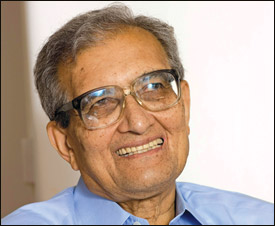Evaluating democracy
Ghazia Aslam and Wasim Q. Malik
A passionate debate comparing and contrasting the performance of
Pakistan's democratic and dictatorial regimes has been raging recently
in various discussion forums. A quantitative yardstick to assess the
effectiveness of a form of Government and its relevance to the local
context of a country can be defined in terms of consequent economic
development.
|

Amartya Sen |
In political science and sociology literature, dictatorship and
democracy have been compared extensively in terms of their effect on
socioeconomic wellbeing and growth. In 'Political Man', Seymour Martin
Lipset's primary argument is that economic development is the product of
democracy. Historical analyses such as his are, however, incapable of
establishing causality between the form of government and economic
outcomes. The reason is that it is not possible to isolate the effect of
the form of governance from that of various other factors such as the
ruler's personality, cultural practices, demographics of the country,
availability of natural resources, and many others.
World war II
A cursory look at post-World War II economic trajectories of various
nations confirms the precariousness of any connection between the form
of Government and economic outcomes due to conflicting trends. While
many western democratic states have prospered, Latin American
democracies with established parliamentary structures, political
parties, unions and competitive elections suffered economic disasters
during the 1980s.
Similarly, many Far Eastern nations have emerged from poverty under
authoritarian rule, but the world is replete with examples of
dictatorships that are in deep economic turmoil.
Some empirical analyses have attempted to control for the effect of
confounding variables such as history or personality, but the results of
these studies remain largely inconclusive.
On the other hand, theoretical analyses also fall short of reaching
consensus on this question. To Amartya Sen, the foremost argument in
favor of democracy is its ability to hold the Government accountable not
only through elections, but also through other participatory mechanisms
such as free press and independent judiciary.
Other advocates of democracy claim that it protects property rights,
promoting an environment of collective growth. The majority in a
democracy is empowered to enact taxation rules and other mechanisms to
steer the redistribution of wealth toward the middle stratum of society.
This, the critics of democracy contend, weakens the property rights of
wealth generators, thus undermining growth.
Another potential problem with democracy is that strategic voting,
with partial or asymmetric information, does not truly represent the
preferences of all citizens, thus negating the very purpose of
democracy.
|

Irrelevant and abandoned |
Political manipulation
Meanwhile, the pro-dictatorship camp argues that an autocratic state
is autonomous and insulated from private pressures, eliminating resource
wastage due to political manipulation. However, the authoritarian
regime, with its absolute discretion, lacks accountability and therefore
makes the ruler prone to predation. In short, while there is agreement
that political institutions safeguarding economic rights are important
for growth, framing the dichotomy in terms of regimes does not seem to
capture the relevant differences.
This assertion becomes more substantial when we recognise that
dictatorships are disparate in their institutional structure. They tend
to differ, among other factors, in the degree of absolutism, operational
transparency, and access to political rights, institutions that affect
economic development.
Many dictatorships in history have governed with councils that
sometimes enjoy formal law-making powers. Many modern dictatorships
allow multiple political parties and legislatures to operate, although
only after controlling the pre-selection of political parties or their
membership.
Carles Boix and Milan Svolik estimate that three-fourths of all
post-WWII dictatorial regimes have ruled with a legislature, and the
majority has relied on a political party to organise their political
support. Similarly, Jennifer Gandhi finds that most post-WWII dictators
operated with multiple parties.
Interestingly, Machiavelli also recognized that some dictators, which
he called 'limited princes' as opposed to 'absolute princes', are reined
in by institutions that empower other actors to oppose the despot.
Gandhi's recent empirical analysis substantiates many historical
readings suggesting that these institutions are effective in
constraining the dictator's behavior.
Dawn.com |



